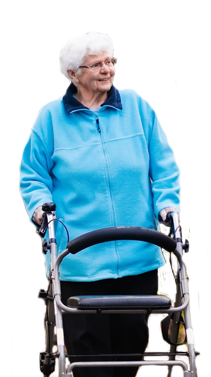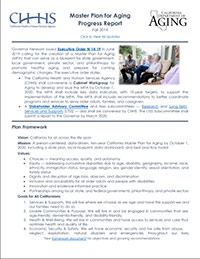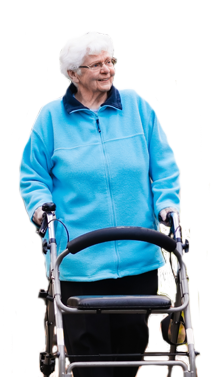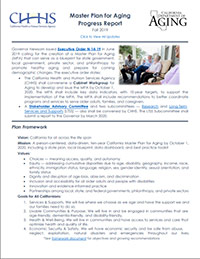Master Plan for Aging Progress Report Fall 2019

Master Plan for Aging Progress Report Fall 2019




On June 10, 2019, Governor Gavin Newsom issued Executive Order N-14-19 calling for the creation of a Master Plan for Aging (MPA) to be developed by October 1, 2020.
Master Plan for Aging Progress Report Fall 2019

On June 10, 2019, Governor Gavin Newsom issued Executive Order N-14-19 calling for the creation of a Master Plan for Aging (MPA) to be developed by October 1, 2020. The purpose of the MPA is to provide a blueprint for state government, local government, private sector, and philanthropy to implement strategies and partnerships that promote aging with health, choice, and dignity, and build an age-friendly State for all Californians. The purpose of the Stakeholder Advisory Committee (SAC) is to provide advice and input to the Administration on the development of the MPA.
Master Plan for Aging
Objectives:
The objectives of the SAC are:- Advise the CHHS Agency and the Cabinet-level Workgroup on Aging in the development of the Master Plan and other related deliverables.
- Assist in developing proposed components of the Master Plan, including policy and program recommendations, best practice resources, data indicators, measurable outcomes, and establishing a timeline and process for implementation, review, and evaluation of the Master Plan.
Guiding Principles:
- SAC meetings seek to provide a collegial and open environment to allow for the expression of diverse and innovative points-of-view from all SAC members.
- SAC meetings aim to support open communication and collaboration between Committee members and the Administration.
- A person-centered, data-driven approach is encouraged by the Administration, as reflected in CHHS Agency’s Guiding Principles.
Operating Principles:
- The SAC plans to be convened in person six times between September, 2019 and October, 2020. Two Subcommittees named in the Executive Order, Research and Long-Term Care, will also meet during this period and additional ad hoc work groups may be convened.
- Meeting agendas for each meeting will be prepared and posted by CHHSA. SAC members are encouraged to suggest agenda items.
- Regular, consistent attendance at the meetings and active participation of members is key to meeting the MPA SAC objectives. Members are strongly encouraged to participate in-person; for those who cannot attend a meeting, teleconferencing may be provided, depending on meeting facility capabilities. Members are asked to make every effort not to send substitutes, delegates, or proxies to meeting. SAC members should contact CDA if this situation arises.
- The State is not able to pay a per diem or compensate members for expenses, including travel and related costs to attend meetings.
- In the event a member withdraws from the SAC, CHHSA will make every effort to replace that member with another individual who represents the constituency represented by the withdrawing member.
Membership:
Members of the MPA SAC are appointed by the CHHS Agency. Membership reflects a broad array of Californians with an interest in building an age friendly California, such as older Californians, adults with disabilities, local government, healthcare providers, health plans, employers, community- based organizations, non-partisan organizations, foundations, academic researchers, and organized labor.
Maya Altman
Health Plan of San Mateo
Jan Arbuckle
City of Grass Valley
Jose Arevalo, MD
Sutter Independent Physicians-Sutter Health
Kathryn Barger
County of Los Angeles
Kristina Bas-Hamilton
United Domestic Workers
Donna Benton, PhD
USC Family Caregiver Support Center
Catherine Blakemore
Disability Rights California
Cheryl Brown
California Commission on Aging
Laura Carstensen, PhD
Stanford University Center on Longevity
Janny Castillo
St. Mary’s Center
Bruce Chernof, MD
The SCAN Foundation
Berenice Nunez Constant
AltaMed Health Services
Jennie Chin Hansen
Former CEO of the American Geriatrics Society
Le Ondra Clark Harvey, PhD
California Council of Community Behavioral Health Agencies
Craig Cornett
California Association of Health Facilities
Susan DeMarois
Alzheimer’s Association
Peter Hansel
CalPACE
Clay Kempf
Seniors Council of Santa Cruz and San Benito Counties
Mercedes Kerr
Belmont Village Senior Living
Darrick Lam
ACC Senior Services
David Lindeman, PhD
Center for Information Technology Research in the Interest of Society
Shelley Lyford
Gary and Mary West Foundation
Marty Lynch
LifeLong Medical Care
Jeannee Parker Martin
LeadingAge California
Christina Mills
California Foundation for Independent Living Centers
Kevin Prindiville
Justice in Aging
Jodi Reid
California Alliance for Retired Americans
Rigo Saborio
St. Barnabas Senior Services
Judy Thomas, JD
Coalition for Compassionate Care
Fernando Torres-Gil, PhD
University of California, Los Angeles
Debbie Toth
Choice in Aging
Nina Weiler-Harwell, PhD
AARP California
Brandi Wolf
Service Employees International Union
Heather Young, PhD, RN
University of California, Davis





